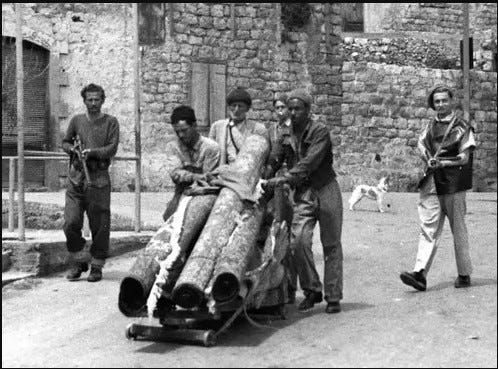In an earlier article, we discussed how Israel’s attack on Egypt in June 1967 did not come from a place of existential fear, but from strategic calculation. Israel had dialogue options on the table, especially around the Straits of Tiran, but still launched a pre-emptive strike. And this isn’t a one-off. It’s part of a broader pattern: using the appearance of dialogue to justify sudden, planned attacks.
This pattern has been confirmed by Israeli leaders themselves, in their own words:
Maj. Gen. Mattityahu Peled, Chief of Logistics in the IDF, said:
“The thesis according to which the danger of genocide hung over us in June 1967 … was nothing but a bluff which was born and bred after the war. … When we spoke of the war in the General Staff, we talked of the political ramifications if we didn’t go to war … Never of survival today.”
(Wikipedia)Gen. Ezer Weizman, Chief of Operations and later President of Israel, said:
“There was never a danger of extermination. This hypothesis had never been considered in any serious meeting.”
(Ha’aretz, 29 March 1972)Gen. Yeshayahu Gavish, Commanding General of the Southern Command:
“The danger of Israel’s extermination was hardly present before the Six‑Day War.”
(Lilienthal, The Zionist Connection, 1978)Gen. Haim Barlev, Chief of the General Staff Branch, said:
“We were not threatened with genocide on the eve of the Six‑Day War, and we had never thought of such a possibility.”
(Ma’ariv, 4 April 1972)Brig. Gen. Chaim Herzog, Military Governor of the West Bank:
“There was no danger of annihilation. Israeli headquarters never believed in this danger.”
(Ma’ariv, 4 April 1972)Defense Minister Moshe Dayan:
“What do you mean, [the war was] unavoidable? It was, of course, possible to avoid the war if the Straits [of Tiran] had stayed closed to Israeli shipping.”
(Ma’ariv interview, 30 March 1968)And last but not least, Menachem Begin, Minister in 1967 and later Prime Minister, admitted:
“In June 1967, we again had a choice. The Egyptian Army concentrations in the Sinai approaches do not prove that Nasser was really about to attack us. We must be honest with ourselves. We decided to attack him.”
(Op-ed, The New York Times, 21 August 1982)
These are not vague critics or outsiders, they are the very architects of the war.
Historians have since confirmed this:
Tom Segev, in 1967: Israel, the War, and the Year That Transformed the Middle East, shows how top Israeli leaders saw the war as winnable and politically useful, less about defense, more about opportunity.
Avi Shlaim, in The Iron Wall, shows how the myth of “imminent annihilation” was built after the war to justify occupation.
Benny Morris, in Righteous Victims, reveals how Israel’s leadership focused on strategic depth, not survival.
The big picture? Israel has repeatedly entered negotiations while quietly preparing military strikes. And we've seen this pattern continue. In the 2023 Gaza conflict, talks were happening, yet military action was already in motion. The same tactic appears in the ongoing conflict involving Iran, Israel, and the US: public messaging around restraint and diplomacy made to lower the other side’s guard, while covert operations, assassinations, and airstrikes move ahead behind the scenes.
Now, deception has always been part of warfare, and in war, it’s often considered a legitimate tool. But diplomacy is something else entirely. It is meant to build trust, reduce tensions, and prevent violence. When states use diplomacy as a façade while planning aggression, they don’t just deceive their adversaries, they damage the very idea of diplomacy.
This approach not only enables war, it corrodes the mechanisms meant to stop it. When dialogue becomes a smokescreen, diplomacy becomes suspect. And in the end, using diplomacy as deception, Israel (and USA) have weakened the very tool most needed to stop the next war.
All articles on Diaspora Dialogue are free to read for one year from publication. If you’ve enjoyed this piece and would like to support my work, you can do so by subscribing, or by buying me a coffee. Thank you for reading and being part of the dialogue!




